James Comey Was Sure He Was Above the Law
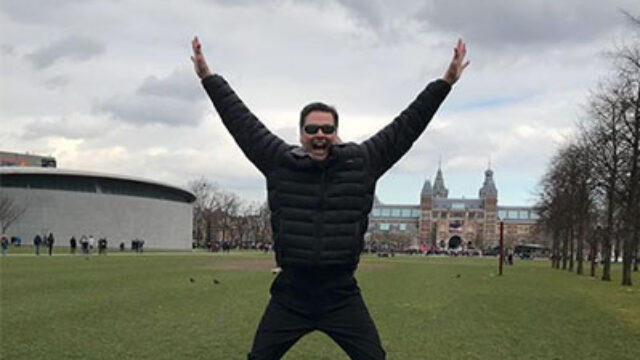
As James Comey is arraigned, new documents show the FBI under his watch criminally investigated first, and looked for reasons later.
While social media and legacy press raged over Bari Weiss, and Republicans thundered over new documentation showing Special Prosecutor Jack Smith monitored the phone records of eight GOP Senators, Iowa’s Chuck Grassley released a disturbing document as part of his opening statement to a Senate Oversight hearing. He revealed that on March 2, 2017, FBI agent Timothy Thibault — part of a now-disbanded political investigation unit called CR-15 — wrote a draft letter detailing interest in investigating Donald Trump:
Somehow a FBI HQ DAD at CD side received information CR-15 was leaning toward open a case on the Trump campaign… What we are doing: Aggressively seeking out open-source information, HUMINT info that could predicate a case.
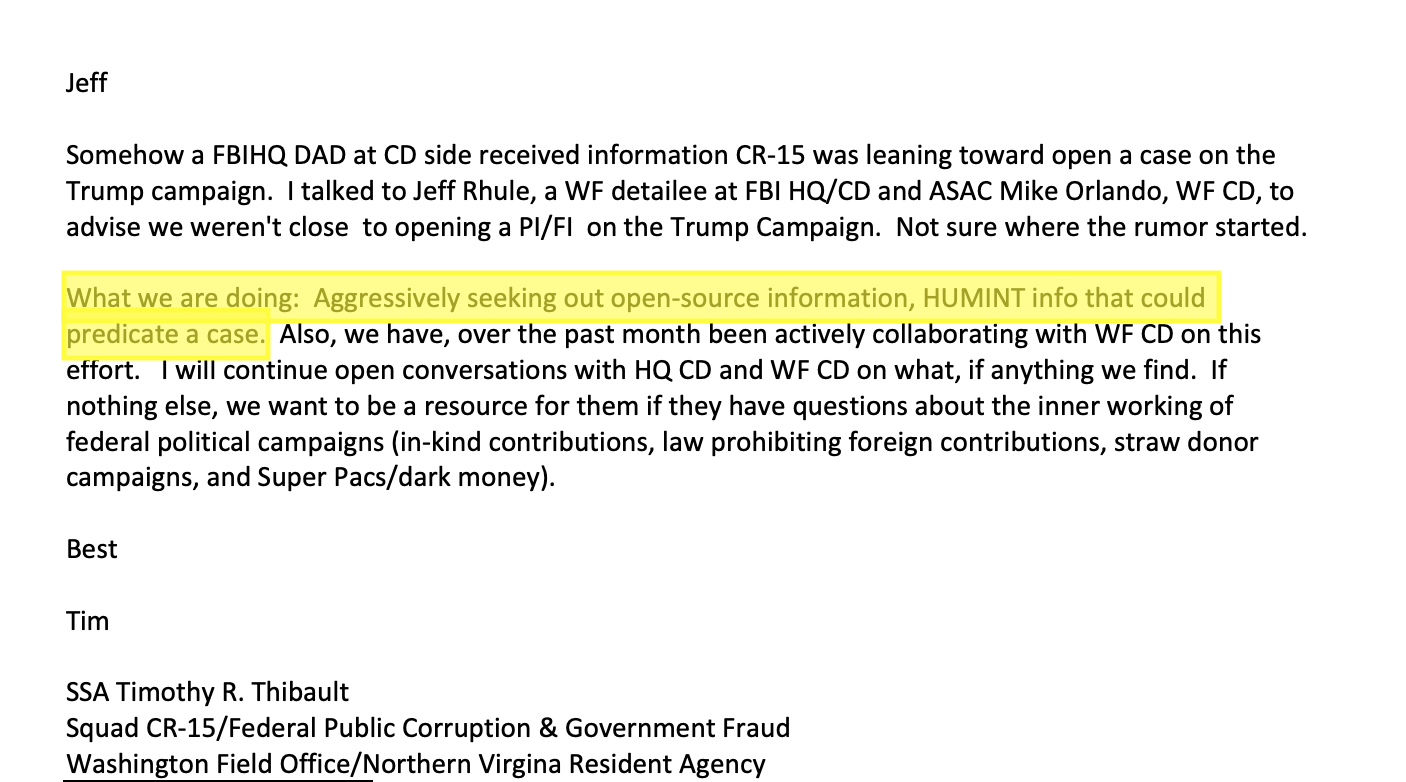
Aggressively seeking… info that could predicate a case.
“Obviously, everything is reversed here,” a spokesperson for Grassley’s office said. “You’re supposed to follow a lead to start a case, not start a case in search of a lead.”
The letter was released before former FBI Director James Comey today pleaded not guilty to charges of lying to Congress. Organic support for the hulking ex-FBI chief at the courthouse was faint. A few protesters held signs reading SHOW TRIAL and WEAPONIZATION OF GOVERNMENT, and media focused unironically on whether or not Trump is “using the justice system against his adversaries.” Comey, the once-mighty FBI chief who interfered with two presidential campaigns in 2016 (although he only conducted intrusive surveillance of one), is now going to argue for dismissal on the grounds that his prosecution is “vindictive.”
Nobody seems to care now, but Trump faced multiple secret investigations at the hands of the FBI under Comey’s watch even before Special Counsel Robert Mueller was appointed to conduct his epic “links and/or coordination” probe. “Crossfire Hurricane,” the first, was absurdly predicated on a conversation between Australian Alexander Downer and Trump aide George Papadopoulos that “suggested the Trump team had received some kind of suggestion from Russia” (a suggestion of a suggestion!). The newly disclosed effort by Thibault openly grasped for predication.
A little-discussed third FBI probe, launched a day before Mueller was appointed in May of 2017, claimed to be seeking to learn “if President Trump is or was directed by, controlled by… the Russian Federation.” No predication has even been released or asserted in that case, as in yet another grotesque joke on the public, the document released in response to a FOIA request was pretty much entirely redacted:
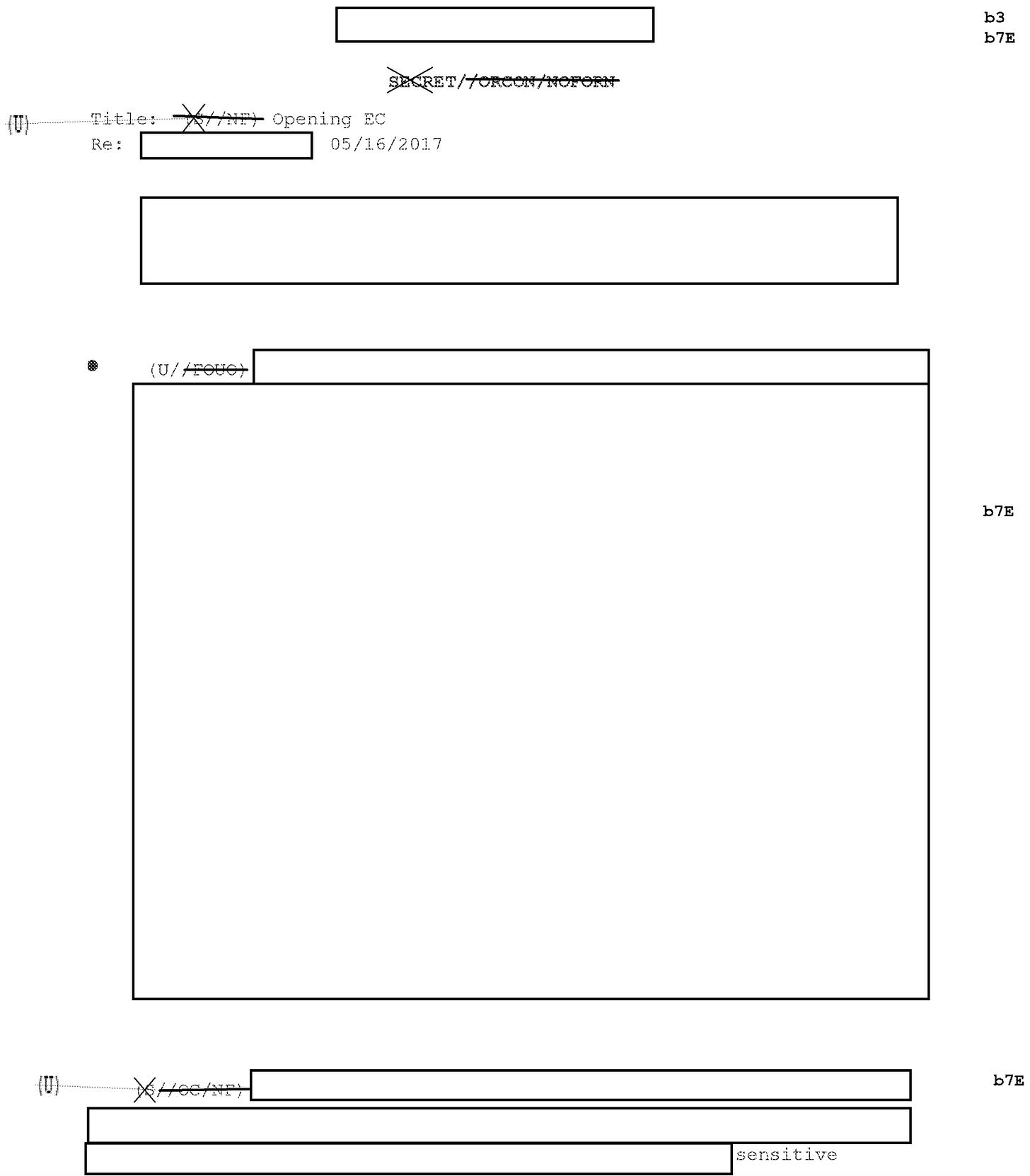
The document above was composed one week after Comey’s firing. If that wasn’t a “vindictive” investigation, initiated in response to Comey’s dismissal, the unredacted document should say so. The Trump administration would be smart to release it.
Anyone tempted to feel sorry for Comey need only read the New York Times account of the hearing today, portraying a “lopsided power dynamic” in favor of the great man:
An uninitiated observer might even have mistaken the defense for the prosecution on Wednesday, given the lopsided power dynamic. To the judge’s right stood Mr. Comey, the former head of the F.B.I. and the Manhattan U.S. attorney’s office, and Mr. Fitzgerald, a former federal prosecutor known for winning convictions in major terrorism and public corruption cases.
On the left, at the prosecutors table, sat Lindsey Halligan, who was making her second-ever appearance as a prosecutor after she was hastily installed by Mr. Trump as the U.S. attorney in the Eastern District of Virginia last month.
That portrait properly frames the Comey trial, scheduled for January 5th. Comey and his supporters see themselves as a wronged government-in-exile, facing off against “vindictive” trespassers who’ve “eroded the rule of law” by prosecuting an innocent intelligence chief. That propaganda is succeeding. Even commentators who seemed to understand the story in the moment seem to have lost enthusiasm for any case that might redound to the benefit of a currently gloating White House occupant like Donald Trump, forgetting that the identity of Comey’s target is the exact reason this case matters so much.
Anything you can get away with doing to an elected billionaire president can be done to everyone. If you get away with breaking attorney-client privilege for Trump, no conversation with any lawyer is safe; if you test-a-lie your way to Trump surveillance warrants, anyone can be spied on; if FBI goons can target the president for criminal investigation first and hunt for predication later, any FBI chief can cook up any case he or she pleases. The prospect of this particular ex-FBI chief walking is outrageous since no one, not even former CIA chief John Brennan, lied so frequently, fluidly, and with such absolute assurance of getting away with it as James Comey:
One of the charges Comey faces is that he lied when asked if he had authorized someone to be an anonymous press source on his behalf. It’s not disputed that he communicated with media through Columbia law professor Daniel Richman, since Comey testified that he asked “a friend of mine to share [information] with a reporter.” Even so, Comey’s self-assurance in coloring outside those lines is remarkable.
Comey composed seven memos about his interactions with Trump and took home four. He told Inspector General Michael Horowitz it “never occurred to him” to put them through a classification review. When asked why he didn’t compose the memos on an FBI computer — like for instance the one in the Sensitive Compartmented Information Facility (SCIF) the FBI had installed in his house — Comey told the IG that he just “wasn’t thinking about” the memos belonging to the government, but rather, “this is for me.” Meanwhile, his Chief of Staff James Rybicki told Horowitz that, “when Comey finished each Memo, he gave Rybicki an original of each, which Comey initialed in blue ink, so that Rybicki could maintain originals of the Memos at the FBI.” An example:
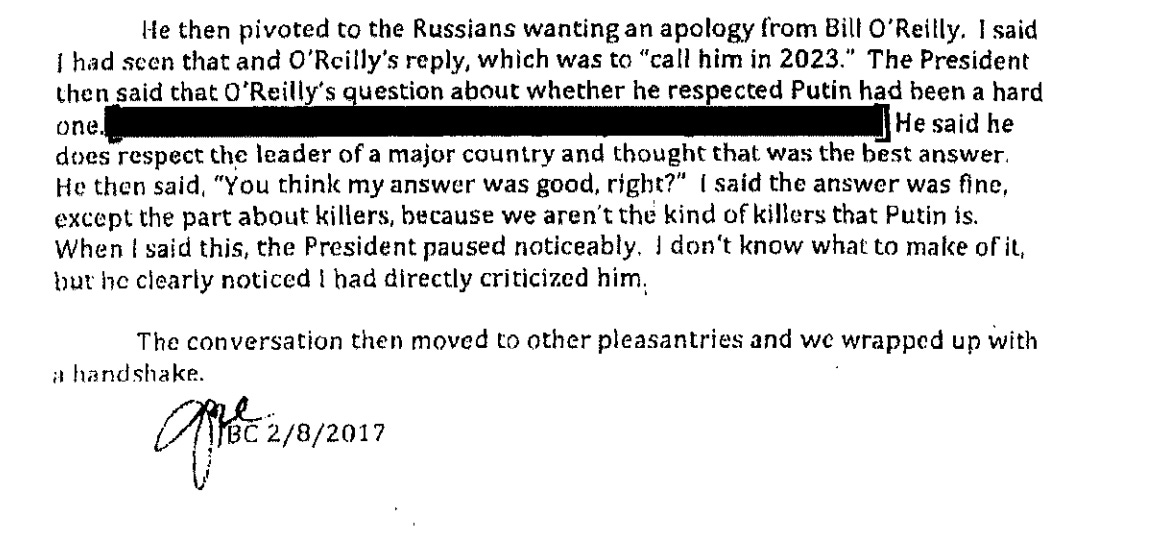
Comey also showed at least four of the memos (including one he brought home) to Crossfire Hurricane investigators, per former FBI operative Lisa Page’s account to the IG. She said Comey met with the Crossfire team “conducting the Russia investigation” after his January 6, 2017 meeting with Trump — this is the one in which Comey told him “the Russians allegedly had tapes involving him and prostitutes” — and both told them about that first memo and forwarded it “to members of the team, to upload into the case file” because it was “central to investigative activity.”
Page was so sure of the memos’ sensitivity that she kept them in a safe, in her office, which itself was a SCIF. FBI General Counsel James Baker, meanwhile, said he “assumed [the Memos] were Government records, because they’re related to official business.” But Comey artlessly told the IG he just assumed those memos were “for him,” like “a personal aide-mémoire,” or “[his] diary,” or “like [his] notes.”
Translation: Comey was running a one-man, off-books investigation into his boss, deciding on the fly what rules did and did not apply to him, with the aim of keeping what amounted to a private kompromat file in his house. Not even J. Edgar Hoover tried this, and not even Comey’s closest colleagues backed the move. As Horowitz noted, “none of the members of Comey’s senior leadership team agreed with or defended Comey’s view that these Memos were personal in nature.” It was obvious these documents were “investigatory in nature,” and Comey made the “aide-mémoire” claim so he could pass notes to Richman and leak a Special Counsel case into being.
Comey appeared completely unconcerned with getting caught. Take the issue of the FBI’s spying on the Trump campaign. This is not a lightly documented activity. There is a colossal Inspector General’s report on the subject of the FBI’s misuse of the FISA process to gain access to information about the Trump campaign. There are also hundreds of pages of declassified documents showing how Comey’s FBI paid informants like Stefan Halper $70,000 to spy on people like former Trump aide Carter Page, one of five “Crossfire” investigative targets (Page was “Crossfire Dragon”) who were the subject of human surveillance.
The document below refers to a meeting right after a Yahoo! story came out falsely calling Page a Kremlin cutout, and just after Page wrote a letter to Comey denying the charges. The FBI responded to Page’s letter by having the informant Halper invite Page to his home in the hope that the “intimate setting” might get him to open up about his “interactions with the campaign” and, of course, conspiratorial relations with Russia.

Bear in mind that the FBI would later claim that what Halper and other “sources” did was not “spying” because they didn’t formally join the Trump campaign, but merely gained their confidence in “intimate” settings to “elicit information.” As the Washington Post put it, “Because the FBI had someone talking to his campaign, Trump is pushing the narrative that the FBI was spying on it.”
Comey would later be asked about this multiple times, most infamously on April 11, 2019. By then, the FBI’s abuse of the FISA process was no longer a secret and information about Halper and “campaign spying” had reached even the legacy press. Yet Comey had the stones to say on television of FISA surveillance, “I’ve never thought of that as spying,” because after all, what he did was “court-ordered electronic surveillance.” This is someone who knows the FISA court was lied to, in documents containing his signature, and also knows this information is going to come out.
Another Comey trick is to try to sneak out a non-fact and then step back and suggest it was a good-faith error if called on it. In an April 2018 interview with Bret Baier he tried to push the old saw that Christopher Steele was “funded first by Republicans”:
This wasn’t true and moreover Comey had to know this wasn’t true, because he signed three of the four FISA applications, in which the motives of the “identified U.S. person” who hired Steele were a major issue. Comey either lied to the FISA court when he signed the document below, or he lied on the air:

There are more instances than one can count of Comey responding with faux-outrage after being busted himself. His reaction to the “Nunes memo” outlining the abuse of the FISA process impressively complained that Devin Nunes “damaged [sic] relationship with the FISA court” — after the FBI serially lied to the court:
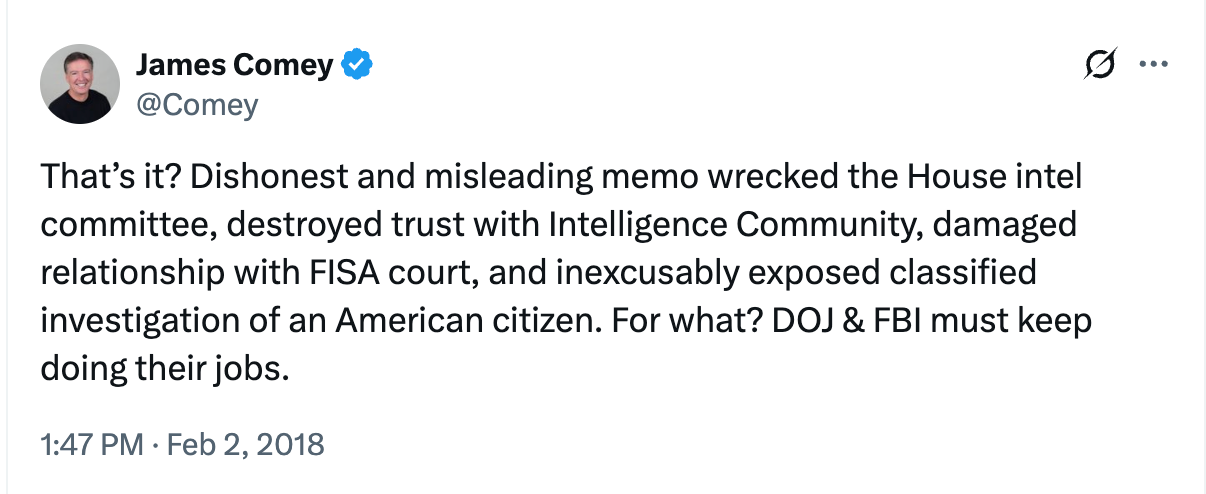
If readers detect a note of frustration it’s because messaging around the Comey affair has succeeded in masking the enormity of the offenses in question. The consequence of years of headlines like the New York Times piece, “F.B.I. Used Informant to Investigate Russia Ties to Campaign, Not to Spy, as Trump Claims,” has left a significant portion of the public unmoved by the now-undisguised reality of the FBI ordering political surveillance of a major-party presidential candidate, then attempting to prosecute using invented evidence. Every conceivable detail must be lied about to uphold the principle of impunity for such behavior. Old friend Ken Dilanian even went with an amazing whopper on MSNBC in coverage of the trial, claiming “it’s not entirely clear” what Comey’s being charged with.
Just baldly untrue… The indictment is clear that Comey is charged with answering in the negative when asked if he “authorized someone else at the FBI to be an anonymous source in news reports.” Zero doubt what this means, but lie about it they must. Characters like Comey can’t just ride off into sunsets of inflated book deals and teaching gigs anymore. They can’t all get away with it, can they?
